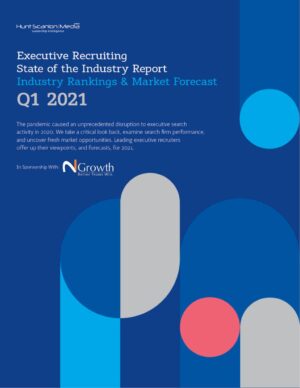Creating a Data-Driven Culture Starts at the Top

June 25, 2021 – For the last decade or so, many companies have been on a mission to become data-driven, and for good reason. According to a new report by Morgan Samuels, the benefits to an organization are innumerable: The business gains a competitive edge, increases operational efficiency and effectiveness, scales the company, becomes more agile, makes more informed decisions, identifies and leverages business opportunities (or risks) sooner, drives innovation and values creation, as well as optimizes business execution. “The business and social challenges and shifting economic landscape of 2020 amplified this transition even further, highlighting the power, value, and potential of data,” the search firm said.
Data is one of the most valuable assets that a company has in its arsenal. And for forward-thinking executive leaders, it’s a strategic asset as well. But you can’t just become data-driven overnight – it requires adjusting your business strategy and even changing the culture. As KPMG said: “Every CEO needs to think very hard about where their business fits into the new data ecosystem.”
 Executive Recruiters & Talent Leaders
Executive Recruiters & Talent Leaders
Reveal Market Forecast
The pandemic caused an unprecedented disruption to executive search activity in 2020. Executive recruiters spent the better part of last year resetting expectations in the midst of an unprecedented interruption to their business. But according to recruiting industry leaders interviewed for this report, the search business is turning a significant corner.
We take a critical look back, examine search firm performance, and uncover fresh market opportunities. Leading executive recruiters offer up their viewpoints, and forecasts, for 2021. The good news: optimism reigns. And that means we could be in for one of the biggest growth spurts the executive search sector has enjoyed in years. Here’s our latest thinking. A special thanks to our co-sponsor: N2Growth! Buy your copy today!
The Data Dilemma
According to Morgan Samuels, despite the value and potential for data, large amounts of it go unused. It has been referred to as dark data – the information assets organizations collect, process, and store during regular business activities, but generally fail to use for other purposes. A survey from Priceonomics found that dark data accounts for 55 percent of an organization’s data on average.
Related: Improving Diversity Starts with a Culture Check
“This could be data that they know they have captured but don’t know how to leverage or data that they are not even certain they have captured,” the Morgan Samuels report said. “Further, this data may go unused because companies don’t have the tools/technology to capture or analyze it, the data is incomplete, the volume is too much to handle, or they only have the systems and processes to manage structured data.”
Data: Challenge or Opportunity?
So, we have data, we have identified a need, and we acknowledge the desire to leverage it, according the report. But despite these factors, a 2021 NewVantage Partners Big Data and AI Executive Survey reveals that only about one in three companies has a well-articulated data strategy and is experiencing transformation business outcomes. The biggest barriers to creating a data-driven organization were found to be people, process, and culture. Technology limitations were identified as the challenge only eight percent of the time.
Per KPMG, “Many CEOs understand in principle the value and potential that data offers yet seem reticent to fully trust (and act on) what the data tells them.” In fact, 25 percent of CEOs indicate they have limited or nonexistent trust in their data. Further, two-thirds have ignored the insights generated by the data in order to make decisions based on their own intuition.
The CEO’s Role in Creating a Data-Driven Culture
“To successfully drive a data-driven culture, CEOs must look beyond making mandates and proclamations,” Morgan Samuels said. “They must be actively engaged in data initiatives, encourage employees to embrace advanced analytics, and take action on the results.” The search firm officers these tips.
Related: How to Create a Culture of Retention
Think about the business. Don’t collect data just for the sake of having data. Consider the potential use-cases for leveraging data and how they could impact the business. Think about what the main challenges are you’re looking to address or problems you’re looking to solve. Then identify the end goal and metrics that will enable the team to track progress.
 Why Total Well-Being is the Biggest Culture Shift to Happen in Decades
Why Total Well-Being is the Biggest Culture Shift to Happen in Decades
In today’s increasingly complex world, people are expected to respond to emails, texts, phone calls, instant messages and social media while communicating in-person with customers and colleagues at work and managing the many competing demands of their personal lives and families.
“As leaders, we are expected to manage our own stress while demonstrating that we genuinely care for our people and how they deal with stress,” said Joseph E. Fournier, vice chairman and president for InveniasPartners. “Holidays, vacations and staycations offer a chance to think about the gifts in our lives.”
Hire the right talent. One of the roadblocks to full data transformation has been accountability, according to Morgan Samuels. Which role or function is owning the data strategy and responsible for leveraging those insights in driving business outcomes? After years of trial and error, many organizations have come to the conclusion that the CEO needs an operational partner to execute on data transformation: a chief data officer. This is a person who can generate business value by leveraging both the company’s data assets and external data sources, develop data-driven competencies across the entire firm, and use data and insights to proactively manage risk.
Transform the culture. Morgan Samuels also says that you need your employees to embrace the power of data and to support the free flow of data across the company. This often requires a culture that is collaborative and open to innovation. The best way to get there? Lead by example! Share a dashboard of key metrics from across the company. Demonstrate your trust in the data and be vocal about its value. Mandate that tools and processes be put in place to capture and analyze data. Build a team of internal champions to reinforce the initiative and highlight their successes.
An article from Harvard Business Review reinforced the idea of leading from the front. “There is little doubt that a CEO’s own reliance on data – or lack thereof – in decision making and improving the business sends a powerful message to the rest of the organization.”
“Becoming a data-driven company is not an easy task,” the Morgan Samuels report said. “And CEOs certainly face some hurdles when it comes to leveraging data in effective decision-making. But those who can build the right team, tools and processes and use them to execute on a data-led strategy will be able to prepare their company for an increasingly unpredictable future.”
Related: Transforming Corporate Culture and Driving Performance in the New Workplace
Contributed by Scott A. Scanlon, Editor-in-Chief; Dale M. Zupsansky, Managing Editor; and Stephen Sawicki, Managing Editor – Hunt Scanlon Media











